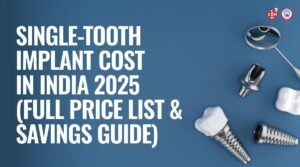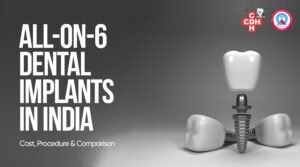A beautiful smile has the power to brighten any environment and reflect confidence in one’s attitude. But a daily routine that goes beyond brushing and flossing is hidden behind that smile. The key element of protecting oral health is routine dental examinations, which work as a preventative approach to stop dental problems before they have a chance to develop.
City Dental Hospital in Rajkot, India, is the leading dental implant clinic in India. It is the top choice for dental tourism among dental tourists worldwide because it offers a top-notch, international level of quality treatment at much lower costs.
Here in this blog, we’ll focus on the ideal dentist visit frequency for good oral health. Let’s take a look!
Importance of Regular Dental Checkups
Maintaining strong, healthy teeth requires preventive dentistry. This entails routine dental visits and at-home oral hygiene. Even though these actions can appear simple, they work well together to preserve general and dental health throughout one’s life.
The critical component of a healthy smile is regular dental checkups; they identify and treat before it worsens. In-depth screenings conducted by experienced dentists during these visits help in
spotting early signs of gum disease, cavities, oral cancer, and other dental problems.
Regular dental checkups provide safeguards that go beyond your regular oral hygiene routine. By removing plaque and tartar accumulation, professional cleanings lower the risk of gum disease, cavities, and oral problems that cannot be addressed through regular brushing and flossing.
Additionally, the dentist can offer tailored guidance on nutrition plans, lifestyle modifications, and good oral hygiene techniques that support long-term dental health.
General Guidelines for Dentist Visits
Several dental associations and specialists recommend dental visits “regularly.” While it is ideal for some individuals to visit their dentist at least once every six months, if they are at a higher risk of developing gum disease, they may need to see the dentist more frequently.
Some dental professionals advise people to visit at least twice a year for routine checkups and cleanings. This enables dentists to examine teeth and determine whether they require treatment for conditions like gingivitis or cavities.
Some people might need to visit a doctor more frequently, and others might not. Individual characteristics such as age, oral health status, and risk factors for dental problems all influence how frequently someone should visit the dentist.

Factors Influencing Frequency of Dental Visits
There are various advantages to regular dental checkups for your oral health. Here are several main factors for the importance of visiting the dentist:
- Address your oral health problems before they worsen: Your dentist can independently identify warning indications you might miss. For example, your cavity might be so small that you only need to pay more attention to brushing and flossing and take extra fluoride medication. However, you would not have discovered this degradation until it worsened and grew more uncomfortable if you hadn’t received your regular cleaning.
- Examine for oral cancers: Dentists look for other symptoms besides gum disease and tooth decay. During your regular dental checkup, you will be screened for mouth, head, and neck cancers. If your dentist finds oral cancer symptoms early, you will likely receive successful treatment and a positive result.
- Invest in early dental treatment to save money in the long run: Early detection and treatment by dentists increase your chances of avoiding financial and medical difficulties like more complicated and expensive dental procedures. For example, the cost of drilling and filling a tiny cavity can be far lower than that of getting a root canal or having a tooth extracted that cannot be salvaged.
Our smile evolves with our body, and the requirements for dental care change as we age, from the first tooth to appear to hormones related to ageing. Let’s explore the impact of age on children, adults, and seniors with different dental demands.
- Children start to lose their baby teeth around the age of five or six when the permanent teeth explode. By age 12 or 13, they often have all their permanent teeth. Although every child is unique from the rest of the family, regular checkups and dental hygiene treatments are recommended for your child to enhance their oral health.
To avoid early decay, a dentist may assess your child’s tooth alignment throughout this period and may suggest fluoride treatments and dental sealants. Additionally, they could instruct children in the fundamentals of brushing and flossing.
- Regular dental checkups and preventative treatment are still crucial to maintaining good oral health, even if your cavity-prone years may have passed now. Oral cancers and periodontal disease become more likely to strike older people. Regular examinations can also guarantee that implants, crowns, fillings, and other therapeutic procedures still function correctly if you have undergone prior restorative procedures.
- Dental problems occur because teeth and gums weaken over decades of exposure. Older people require specific oral care, ranging from attrition to dry mouth. Following your dentist’s instructions for maintaining your dentures and scheduling routine checkups to spot wear or damage will help you maintain your oral wellness even if you already need full or partial dentures.
When it comes to oral health, health issues, lifestyle choices, and genetic predispositions can all impact it.
- More regular dental checkups are necessary because certain medical diseases, such as diabetes, cancer, AIDS/HIV, Alzheimer’s, etc., may have an impact on oral health.
- Unhealthy lifestyle choices, such as smoking, eating unhealthy foods, Irregular brushing practices, sugar consumption, nicotine use, alcohol use, and others, can cause cavities, bad breath, loosening of the teeth, and numerous oral health problems. Smoking is the cause of gum disease in adults, with about 75% of cases. That’s why it’s essential to live a healthy lifestyle and do a regular dental visit to avoid these dental problems.
- Many oral health problems, including tooth formation, decay, and gum disease, can be influenced by genetic factors. To prevent genetic dental issues and to promote long-term dental wellness, one must practice good oral hygiene, lead a healthy lifestyle, and need more frequent dental visits. Dentists will use your genetic information to personalize preventative measures and treatment approaches for better oral health results.

Special Considerations for Dental Implant Patients
Dental implants have completely changed the dental industry by giving those who lack teeth a long-term solution. But getting a fully restored smile is a process that goes beyond simply having dental implants surgically inserted.
For the healing process to be successful, it is essential to make routine follow-up visits with your dentist to check on it and ensure the implants are correctly integrated. During these consultations, the dentist can also address any worries you may have or respond to inquiries you may have regarding the healing process.
Dental implant patients may require frequent dental visits in the initial stages to monitor the healing process and ensure implant success.
The initial healing time after implant surgery is crucial. This means allowing the implants to undergo a process called osseointegration, which usually takes a few weeks to connect with the jawbone. Dental implant patients may require more frequent dental visits in the initial stages to monitor the healing process and ensure implant success.
Dental implants need regular maintenance, just like our natural teeth. To ensure the longevity of your dental implants, you must practice good oral hygiene, brushing, flossing, avoiding smoking or any other tobacco, considering antimicrobial mouthwash, professional cleanings, and regular dental checkups, if you want your dental implants to last for a long time.
Appropriate maintenance extends the usable life of the implant by lowering the possibility of issues such as implant failure and peri-implantitis.
City Dental Hospital’s Approach to Dental Care
City Dental Hospital is the best dental hospital in India; we are committed to providing comprehensive dental care to patients in Rajkot and beyond. We provide adaptable scheduling, personalized attention, reasonable prices, clear treatment explanations, and first-rate patient care while sticking to strict hygienic standards.
The City Dental Hospital focuses on preventive dentistry, including regular checkups, cleanings, and patient education. With years of knowledge and experience, we are dedicated to giving our customers the best dental care possible and a wide range of services they need to get the smile they deserve.
City Dental Hospital stands as India’s leading destination for dental implants and dental tourism. It provides top-tier dental care, featuring advanced technology, durable biocompatible materials, and a focus on preventive, pain-free, and cosmetic dental treatments.
We aim to prevent patients from losing teeth, developing gum disease, or needing additional needless fillings. We provide modern dental care to patients both nationally and internationally. We have treated nearly 4,000 patients from 50 nations.

Conclusion
Regular dental visits have several advantages that go beyond dental health to improve general well-being. They help maintain oral health and prevent dental problems. By prioritizing dental hygiene habits, people can preserve their smiles without having to go through complex and expensive procedures. Regular dental checkups are a preventative step toward a healthier, happier you.
A professional cleaning and examination of your teeth is essential for maintaining oral health and avoiding further problems. Prioritize your dental health by scheduling regular checkups with your dentist.
City Dental Hospital’s mission is to offer comprehensive, durable, and reasonably priced dental care in the shortest amount of time while creating a welcoming environment all under one roof.
Make an appointment with our experienced and welcoming staff so we can examine your dental health and recommend how frequently you should get a checkup. You can make an appointment by calling +91-81000-42000.













